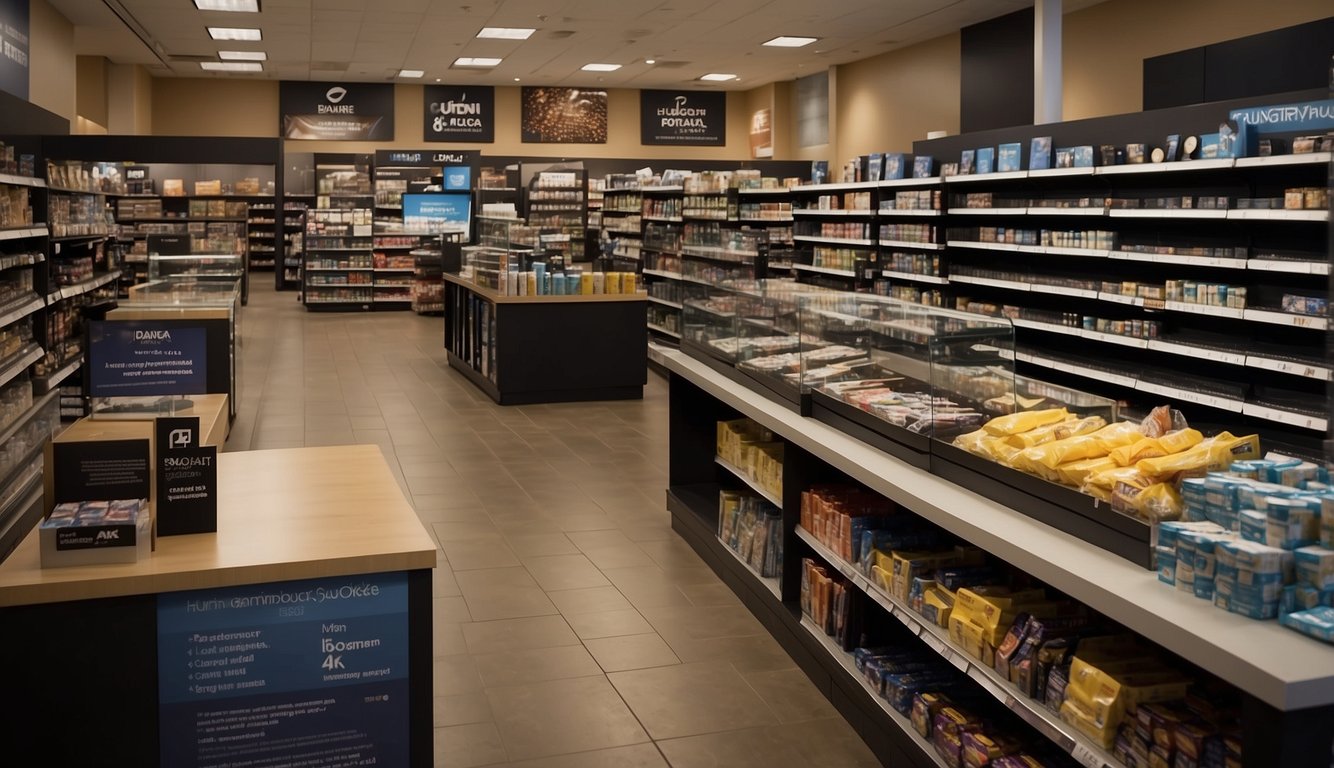Starting a mini supermarket business in Nigeria can be a profitable venture if done correctly. With the growing population and increasing demand for convenience, mini supermarkets have become a popular shopping destination for many Nigerians. However, starting a mini supermarket business requires careful planning and execution to ensure success.
Firstly, it is important to conduct thorough market research to understand the needs and wants of your target audience. This will help you determine the location, products, and services that will be most profitable for your mini supermarket.
Additionally, you will need to obtain the necessary licenses and permits from the appropriate authorities to legally operate your business.
Once you have established your mini supermarket, it is important to maintain a high level of customer service to retain customers and attract new ones.
This can be achieved through offering competitive prices, stocking high-quality products, and providing a clean and organized shopping environment.
Following these steps, you can start and operate a mini supermarket business in Nigeria.
Table of contents
- Understanding the Nigerian Market
- Developing a Business Plan
- Legal and Regulatory Requirements
- Choosing the Right Location
- Setting Up the Supermarket
- Inventory Management
- Marketing and Sales Strategies
- Operational Management
- Managing Utilities and Services
- Expanding Product Offerings
- Ensuring Customer Satisfaction
- Financial Management
Understanding the Nigerian Market

Starting a mini supermarket business in Nigeria requires a good understanding of the local market.
The Nigerian market is diverse, with a population of over 200 million people. This presents a massive opportunity for entrepreneurs looking to start a business in the country.
Population and Consumer Behavior
The Nigerian population is young and growing rapidly, with about 60% of the population under the age of 25. This demographic is tech-savvy and highly connected, which makes it easier for businesses to reach them through social media and other online platforms.
Consumer behavior in Nigeria is also changing, with more people opting for convenience and quality over price. This has increased demand for supermarkets and other retail outlets offering a wide range of products and services.
Competition and Market Trends
The Nigerian market is highly competitive, with many players in the retail industry. However, there is still room for new entrants, especially in underserved areas. Understanding the competition and market trends is crucial for the success of any mini supermarket business in Nigeria.
Some of the current market trends in Nigeria include the rise of e-commerce, the growing demand for organic and healthy food products, and the increasing popularity of private-label brands. Keeping up with these trends and adapting to changing consumer preferences is key to staying competitive in the Nigerian market.
In conclusion, understanding the Nigerian market is essential for anyone looking to start a mini supermarket business in the country. With a growing population, changing consumer behavior, and increasing competition, entrepreneurs must stay informed and adaptable to succeed in this dynamic market.
Developing a Business Plan

Starting a mini supermarket business in Nigeria requires a well-structured business plan that outlines the business’s feasibility study and financial planning.
A business plan is a roadmap that guides the business owner on how to run the business effectively and efficiently. Here are some subsections to consider when developing a business plan:
Feasibility Study
A feasibility study is an essential aspect of developing a business plan. It helps to determine the business idea’s viability and assess the market demand for the products.
Conducting a feasibility study involves researching the target market, analyzing the competition, and determining the profit margin. It also helps to identify potential risks and challenges that may arise and how to mitigate them.
Financial Planning
Financial planning is a crucial aspect of developing a business plan. It involves determining the capital required to start the business, the expected profits, and the funding sources. The business owner needs to determine the rent, equipment, inventory, and staffing costs. It’s also important to consider the profit margin and the business’s break-even point.
To finance the business, the owner can seek investors’ funding or apply for a bank loan. It’s essential to have a detailed financial plan that outlines the expected profits and the repayment plan for the loan. The business owner should also consider the cost of financing and its impact on the profits.
In conclusion, developing a business plan is critical in starting a mini supermarket business in Nigeria. It helps the business owner determine the business idea’s feasibility and financial requirements. With a well-structured business plan, the business owner can secure funding, manage the business effectively, and achieve profitability.
Legal and Regulatory Requirements

Starting a mini supermarket business in Nigeria requires compliance with various legal and regulatory requirements.
This section will outline the necessary steps to ensure that your business is registered and operating in accordance with local laws.
Business Registration
The first step in starting your mini supermarket business is to register your business with the Corporate Affairs Commission (CAC). You must choose a unique business name and provide documentation such as your Certificate of Incorporation, Form CAC1.1, and Memorandum and Articles of Association.
Once your business is registered, you will be issued a Business Registration Certificate (BRC), a legal requirement to operate a business in Nigeria. It is important to note that failure to register your business can result in legal consequences and fines.
Complying with Local Laws
In addition to business registration, it is important to comply with local laws and regulations. This includes obtaining necessary licenses and permits from local authorities, such as a trade license and fire safety certificate.
You should also adhere to health and safety regulations, such as proper food storage and handling practices, to ensure the safety of your customers. Failure to comply with these regulations can result in fines or even closure of your business.
It is important to stay up-to-date with changes in local laws and regulations that may affect your business. This can be done by regularly checking with local authorities or consulting a legal professional.
By following these legal and regulatory requirements, you can ensure that your mini supermarket business is operating legally and safely in Nigeria.
Choosing the Right Location

When starting a mini supermarket business in Nigeria, choosing the right location is crucial to the success of your business.
Your location should be easily accessible and visible to potential customers. Here are some factors to consider when choosing the right location for your mini supermarket:
Visibility and Accessibility
Your mini supermarket should be located in an area with high foot traffic and good visibility. This will increase the chances of potential customers noticing and visiting your store.
Consider locating your store near busy roads, shopping malls, markets, and residential areas.
Also, ensure that your store is easily accessible by car and public transportation.
Rent and Infrastructure
The cost of rent and infrastructure is another important factor to consider when choosing the right location for your mini supermarket. Lagos and FCT are popular locations for mini supermarkets, but the cost of rent in these areas can be high. Consider other locations that are affordable and have good infrastructure. You should also consider the availability of utilities such as electricity, water, and waste disposal.
In summary, choosing the right location for your mini supermarket is crucial to the success of your business. Your location should be easily accessible and visible to potential customers. Consider the cost of rent and infrastructure when choosing a location. By considering these factors, you can increase the chances of success for your mini supermarket business.
Setting Up the Supermarket

Once you have secured a location for your mini supermarket, it’s time to set it up. This involves designing the interior layout and sourcing and stocking products.
Interior Layout and Design
The interior layout of your mini supermarket is crucial to the success of your business. You want to ensure your customers can easily navigate the aisles and find their needs.
Consider using a grid-like layout with clearly marked sections for different categories of products. This will make it easier for customers to find what they’re looking for and help you keep track of your inventory.
Invest in sturdy shelves that can hold the weight of your products and are easy to clean. Ensure your shelves are well-organized and products are clearly labeled with prices.
You should also pay attention to your mini supermarket’s lighting and overall design. Use bright lighting to make your space feel welcoming and inviting. Consider adding some greenery or other decorative elements to add to the ambiance.
Sourcing and Stocking Products
To stock your mini supermarket, you’ll need to find reliable suppliers, manufacturers, and distributors to stock your mini supermarket. Look for wholesalers or product suppliers that offer competitive prices and high-quality products.
When choosing products to stock, consider the needs and preferences of your target market. You may also want to carry a mix of popular brand-name products and lesser-known, locally sourced products.
Keep track of your inventory and make sure to restock products in a timely manner. This will help you avoid running out of popular items and keep your customers happy.
Setting up your mini supermarket requires careful planning and attention to detail. By designing a functional and attractive interior layout and sourcing high-quality products, you can create a successful business that meets the needs of your community.
Inventory Management

Managing your inventory is crucial to the success of your mini supermarket business in Nigeria. You need to keep track of your stock levels, ensure that you have enough products to meet customer demand, and avoid overstocking, which can lead to wastage and losses.
This section will discuss some inventory management tips that will help you run your business efficiently.
Keeping Track of Stock
The first step in inventory management is keeping track of your stock levels. You need to know how much inventory you have on hand, how much you have sold, and how much you need to order. You can use an inventory management system that tracks your sales and inventory levels in real time. This will help you decide when to order more products and how much to order.
Another important aspect of keeping track of stock is conducting regular stock takes. This involves physically counting your inventory to ensure your records match your stock levels. This will help you identify discrepancies and take corrective action before they become bigger problems.
Warehouse and Storage Solutions
Proper storage of your inventory is also important for inventory management. You need to ensure that your products are stored in a safe and secure environment that protects them from damage and theft. This can be achieved by investing in a good warehouse and storage solutions.
Your warehouse should be well-organized and easy to navigate. You can use labeling systems and storage racks to make finding products easier and keeping track of your inventory. You should also ensure your warehouse is clean and free from pests and other contaminants that can damage your products.
In addition, you should consider investing in temperature-controlled storage solutions for products that require specific storage conditions. This will help you maintain the quality of your products and avoid wastage due to spoilage.
By implementing these inventory management tips, you can ensure that your mini supermarket business in Nigeria runs smoothly and efficiently.
Marketing and Sales Strategies

When running a mini supermarket business in Nigeria, it is important to have a solid marketing and sales strategy in place.
Here are some key strategies to consider:
Pricing and Discounts
One of the most important aspects of your marketing strategy is pricing. You need to ensure that your prices are competitive while still allowing you to make a profit.
Take the time to research your competitors and find out what they are charging for similar products. You can then adjust your prices accordingly.
Offering discounts is another effective way to attract more customers and increase sales. Consider offering discounts on bulk purchases or running special promotions during holidays or other special occasions.
Promotions and Advertising
Promotions and advertising are essential for getting the word out about your mini supermarket business. Consider running promotions on social media platforms such as Facebook and Instagram. You can also advertise in local newspapers and billboards to reach a wider audience.
Another effective way to promote your business is by offering loyalty programs and rewards for repeat customers. This will help to build customer loyalty and increase sales over time.
In summary, developing a strong marketing and sales strategy is critical for the success of your mini supermarket business in Nigeria. By focusing on pricing, discounts, promotions, and advertising, you can attract more customers and increase sales over time.
Operational Management

Staffing and Training
One of the most important aspects of running a mini supermarket business is having a well-trained and efficient staff. You need to hire staff members who are reliable, friendly, and have good communication skills. You will need to train them on how to provide excellent customer service, handle cash transactions, and stock shelves. It is also important to provide ongoing training to ensure they are up-to-date with new products and promotions.
You should conduct a staffing analysis to ensure that you have the right number of staff members. This will help you determine the number of staff members you need based on the size of your store, the number of customers you expect, and the number of products you sell.
Security and Loss Prevention
Security and loss prevention are important aspects of running a mini supermarket business. You need to ensure that your store is secure and that measures are in place to prevent theft. This can include installing security cameras, hiring security personnel, and implementing anti-theft measures such as security tags on products.
In addition to preventing theft, you must ensure your store is safe for customers and staff members. This can include implementing safety measures such as fire alarms, emergency exits, and first aid kits.
To ensure that your staff members know the security and safety measures in place, you should provide training on these topics. This will help them identify potential security risks and respond appropriately in an emergency.
Remember that the success of your mini supermarket business largely depends on the efficiency of your operational management. By ensuring that you have well-trained staff members and effective security and loss prevention measures in place, you can create a safe and welcoming shopping environment for your customers.
Managing Utilities and Services

Managing your utilities and services is crucial to ensure your business runs smoothly as a mini supermarket business owner.
This section will cover two important aspects of managing utilities and services: power supply, backup systems technology, and automation.
Power Supply and Backup Systems
Power supply is a critical aspect of running a mini supermarket business. In Nigeria, electricity supply can be unreliable, so it is important to have a backup plan in case of power outages. Consider investing in a generator set to ensure your business can continue operating during power outages.
In addition to having a backup generator, it is also important to ensure that your supermarket has proper lighting. This will not only create a welcoming environment for your customers, but it will also ensure that your employees can work safely and efficiently. Consider investing in energy-efficient lighting solutions to save on electricity costs.
Technology and Automation
Technology and automation can help streamline your mini supermarket business operations in today’s fast-paced world. Consider using automated machines for tasks such as weighing and packaging products. This can help save time and reduce labor costs.
In addition, consider using technology to manage your inventory and sales. Point of sale (POS) systems can help you track sales, manage inventory, and generate reports. This can help you make informed business decisions and improve overall efficiency.
Overall, managing your utilities and services is critical to the success of your mini supermarket business. Investing in backup power systems and utilizing technology and automation ensures that your business runs smoothly and efficiently.
Expanding Product Offerings

Expanding your product offerings is crucial to growing your mini supermarket business. You can attract more customers and increase your sales revenue by providing a more comprehensive range of products.
Here are some tips to help you expand your product offerings:
Identifying High-Demand Products
To expand your product offerings, you need to identify high-demand products your customers will likely buy. Conduct market research to determine which products are in high demand in your area. You can also ask your customers for feedback on the products they want to see in your store.
Some of the high-demand products you can consider adding to your mini supermarket include groceries, toiletries, cosmetics, toys, canned foods, organic food, hair products, clothes, pharmaceutical products, poultry products, household products, sports equipment, electronics, seasonal products, foodstuffs, meats, and perishables.
Diversifying Product Categories
Diversifying your product categories is another way to expand your product offerings. Offering a wider range of products can attract more customers and increase your sales revenue. Consider adding new product categories such as health and wellness, pet, and baby products.
You can also consider offering a range of international products to cater to the diverse needs of your customers. For example, you can offer Asian, African, or European food products to attract customers from different cultural backgrounds.
In conclusion, expanding your product offerings is a great way to grow your mini supermarket business. You can attract more customers and increase your sales revenue by identifying high-demand products and diversifying your product categories.
Ensuring Customer Satisfaction

As a mini supermarket business owner, ensuring customer satisfaction should be one of your top priorities. Happy customers are more likely to return and recommend your business to others, which can ultimately lead to increased revenue.
Here are some tips to help you ensure customer satisfaction:
Quality Customer Service
Providing quality customer service is essential to ensuring customer satisfaction. Your employees should be friendly, knowledgeable, and helpful. They should be able to answer customers’ questions and provide recommendations when needed.
It’s also important to ensure that your employees are well-trained and capable of handling any customer complaints or issues that may arise.
Creating a Shopping Experience
Creating a positive shopping experience can also help to ensure customer satisfaction. Include things like having a clean and organized store, playing pleasant music, and offering free samples of products. You can also offer loyalty programs or discounts for repeat customers to encourage them to return.
In addition, providing self-service options can also help to enhance the shopping experience. This can include things like self-checkout kiosks or providing shopping carts and baskets for customers to use. By providing these options, you can help to make the shopping experience more convenient and efficient for your customers.
Overall, ensuring customer satisfaction is crucial to the success of your mini supermarket business. By providing quality customer service and creating a positive shopping experience, you can help to build a loyal customer base and increase your revenue.
Financial Management

Starting a mini supermarket business in Nigeria requires careful financial management to ensure profitability.
Here are some tips on how to manage your finances effectively:
Monitoring Revenue and Expenses
It is crucial to keep track of your revenue and expenses to determine the profitability of your mini supermarket business. You can use accounting software or spreadsheets to record your daily sales and expenses. This will help you identify which products are selling well and which are not, enabling you to make informed decisions about inventory management.
You should also monitor your expenses closely to ensure you are not overspending on overhead costs, such as rent, utilities, and employee salaries. By closely monitoring your revenue and expenses, you can identify areas where you can cut costs and increase your profit margins.
Maximizing Profitability
To maximize profitability, you must focus on increasing your revenue while minimizing expenses. One way to do this is by negotiating with suppliers to get better prices on the products you sell. You can also offer discounts and promotions to attract more customers and increase sales.
Another way to maximize profitability is by optimizing your inventory management. By keeping track of your inventory levels and ordering products in bulk, you can reduce your costs and increase your profit margins.
In addition, you should regularly review your pricing strategy to ensure you are charging competitive prices for your products. You can attract more customers and increase your revenue by offering competitive prices.
Overall, effective financial management is essential for the success of your mini supermarket business in Nigeria. By monitoring your revenue and expenses and maximizing your profitability, you can ensure your business is profitable and sustainable in the long run.
Let me know if you have any questions or need further clarification. I would love to assist you.
You can watch my videos on the Studentship YouTube Channel by clicking here.
Join my Facebook Group, Like my Facebook Page or Follow Me on WhatsApp for more interactive discussions.
